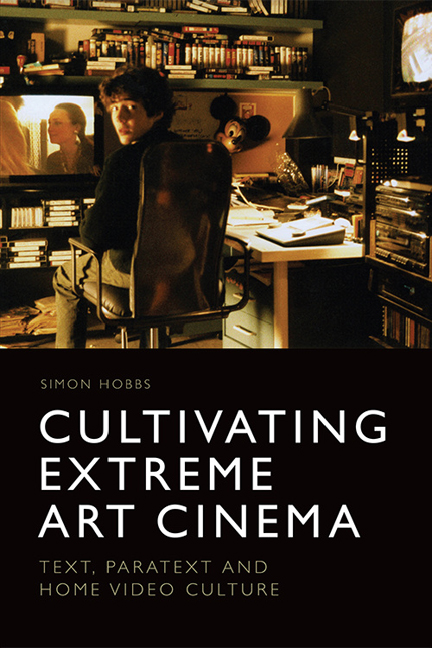Book contents
- Frontmatter
- Contents
- List of Figures
- Acknowledgements
- 1 Introduction
- 2 Art and Exploitation: Crossover, Slippage and Fluidity
- 3 Early Extremity on DVD: History, Precursors and Exploitation Auteurs
- 4 Weekend and Cannibal Holocaust: Art, Ballyhoo and Remediation
- 5 Salò, Or the 120 Days of Sodom and Ilsa, the Wicked Warden: Fascism, Pornography and Disgust
- 6 Contemporary Extremity on DVD: Trends, Hard-core and Geographic Mobility
- 7 Michael Haneke: Glaciation, Legitimacy and Transgression
- 8 Lars von Trier: Provocation, Condemnation and Confrontation
- 9 Conclusion
- Bibliography
- Index
7 - Michael Haneke: Glaciation, Legitimacy and Transgression
Published online by Cambridge University Press: 28 April 2021
- Frontmatter
- Contents
- List of Figures
- Acknowledgements
- 1 Introduction
- 2 Art and Exploitation: Crossover, Slippage and Fluidity
- 3 Early Extremity on DVD: History, Precursors and Exploitation Auteurs
- 4 Weekend and Cannibal Holocaust: Art, Ballyhoo and Remediation
- 5 Salò, Or the 120 Days of Sodom and Ilsa, the Wicked Warden: Fascism, Pornography and Disgust
- 6 Contemporary Extremity on DVD: Trends, Hard-core and Geographic Mobility
- 7 Michael Haneke: Glaciation, Legitimacy and Transgression
- 8 Lars von Trier: Provocation, Condemnation and Confrontation
- 9 Conclusion
- Bibliography
- Index
Summary
This chapter will position Michael Haneke as part of the extreme art cinema tradition mapped so far and explore the way his paratextual identity partakes in the history of taste slippage and cultural crossover that has been this work's focus. This change from the comparative structure used in Chapters 4 and 5 seeks to respond to the industrial changes outlined in Chapter 6. However, it is not only these cultural and aesthetic shifts that are of significance. Mark Bernard notes that whilst violent films were marginalised on VHS, the aura of quality surrounding DVD and Blu-ray instantly welcomed them into the mainstream and its systems of consumption (2015: 57). This escalated the frequency with which audiences were met with images of extremity, nominalising their appearance both internally within the text and externally upon the paratext. Accordingly, this chapter looks at how Haneke's commercial image is constructed within this increasingly extreme filmic environment, noting the ways it is filtered through the traditions of art cinema, exploitation cinema, mainstream American genre cinema and excessive European horror cinema.
Michael Haneke: ‘Respectable’ Extremity
Michael Haneke has established himself as one of Europe's leading auteurs, with two of his last three films – The White Ribbon (Haneke 2009) and Amour (Haneke 2012) – claiming the Palme d’Or at Cannes. An award soaked with ‘highbrow’ significance, the Palme d’Or serves as a definitive sign of critical and cultural validation and gifts Haneke's filmography an aura of prestige and eminence. This acclaim, as is perhaps expected, is echoed within the critical discourse, as Haneke enjoys a largely positive reception culture. David Bordwell's notion of the conceptual field – whereby critics use a series of items, cues and stylistic features to interpret a film and position it within particular cultural frameworks (1993: 101) – is significant for understanding Haneke's relationship to the critical sphere. Bordwell states, ‘we don't just see meanings, literal or interpretive; the critic constructs meaning’ (1993: 103). As these constructed meanings become published, they evolve into loaded and publically circulating interpretations, with the ability to shape the audience's feelings towards a certain text. Unlike the majority of extreme art filmmakers, who struggle to achieve a harmonious critical image, Haneke's work is consistently endorsed and afforded readings which ultimately lead to even greater respect and status. This is significant, as these reviews, interviews and articles are becoming increasingly aligned with the DVD and Blu-ray product.
- Type
- Chapter
- Information
- Cultivating Extreme Art CinemaText, Paratext and Home Video Culture, pp. 139 - 162Publisher: Edinburgh University PressPrint publication year: 2018



